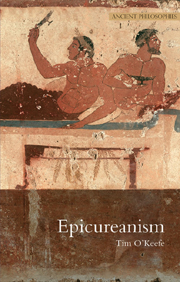Book contents
- Frontmatter
- Contents
- Preface
- Acknowledgements
- Sources and abbreviations
- Chronology
- 1 Introduction: the life of Epicurus and the history of Epicureanism
- I Metaphysics and physics: introduction and overview
- 2 Atoms and void
- 3 Atomic motion
- 4 Sensible qualities
- 5 Cosmology
- 6 Biology and language
- 7 The mind
- 8 Freedom and determinism
- II Epistemology: introduction and overview
- III Ethics: introduction and overview
- Glossary of terms
- Notes
- Further reading
- Bibliography
- Index
6 - Biology and language
from I - Metaphysics and physics: introduction and overview
- Frontmatter
- Contents
- Preface
- Acknowledgements
- Sources and abbreviations
- Chronology
- 1 Introduction: the life of Epicurus and the history of Epicureanism
- I Metaphysics and physics: introduction and overview
- 2 Atoms and void
- 3 Atomic motion
- 4 Sensible qualities
- 5 Cosmology
- 6 Biology and language
- 7 The mind
- 8 Freedom and determinism
- II Epistemology: introduction and overview
- III Ethics: introduction and overview
- Glossary of terms
- Notes
- Further reading
- Bibliography
- Index
Summary
As we have seen, the Epicureans try to exclude the gods from the creation and administration of the world. But to complete the job, the Epicureans need to give a non-teleological account for the formation not only of the heavenly bodies and of phenomena like thunderbolts, but also of organisms. And this is a difficult task. It is one thing to say that the thunderbolt is merely the squeezing out of seeds of fire from the collisions of clouds, and that the distribution of thunderbolts over the seas, mountains and deserts shows no pattern or purpose, quite another to say that the eye and heart exhibit no purpose. In ancient times, the apparent craftsman-like skill exhibited in the cunning organization of our bodily parts was often taken as one of the primary pieces of evidence for the existence of a wise craftsman god, and this sort of argument has persisted through William Paley and current proponents of intelligent design.
In response to this challenge, the Epicureans propose that the organisms around today are the result of a long process of natural selection, and so we can account for organisms' well-adaptedness for survival and reproduction without appealing to any sort of purpose. This explanation has been rightly compared to Charles Darwin's theory of natural selection. However, it is important not to overstate the similarity, as the Epicurean theory appeals to natural selection but without the evolution of species.
- Type
- Chapter
- Information
- Epicureanism , pp. 51 - 60Publisher: Acumen PublishingPrint publication year: 2009

